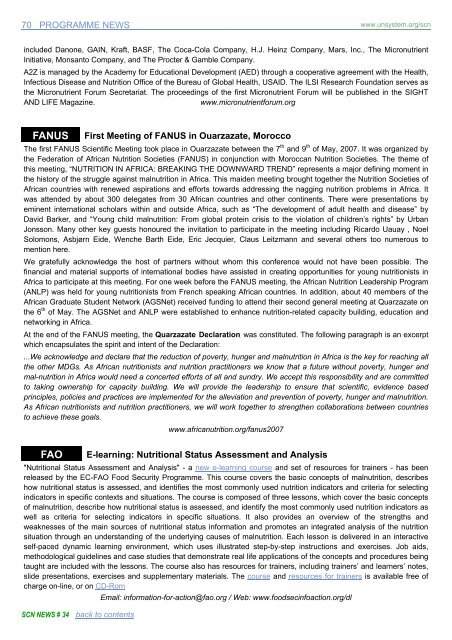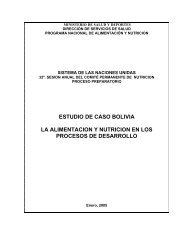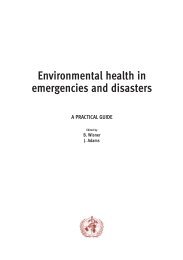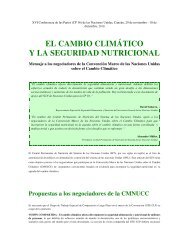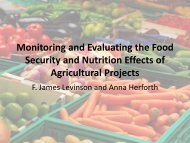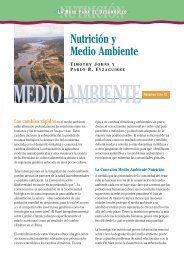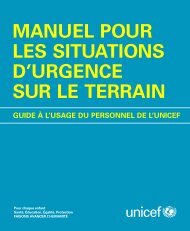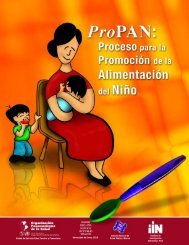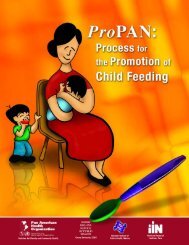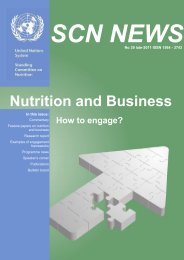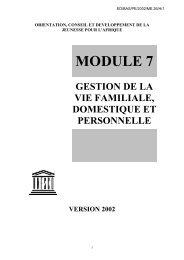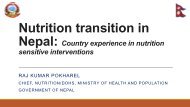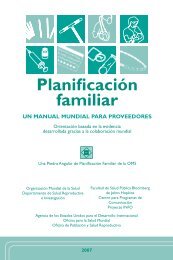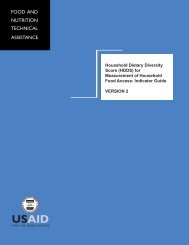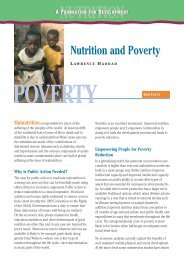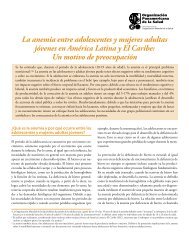SCN News No 34 - UNSCN
SCN News No 34 - UNSCN
SCN News No 34 - UNSCN
Create successful ePaper yourself
Turn your PDF publications into a flip-book with our unique Google optimized e-Paper software.
70 PROGRAMME NEWS<br />
www.unsystem.org/scn<br />
included Danone, GAIN, Kraft, BASF, The Coca-Cola Company, H.J. Heinz Company, Mars, Inc., The Micronutrient<br />
Initiative, Monsanto Company, and The Procter & Gamble Company.<br />
A2Z is managed by the Academy for Educational Development (AED) through a cooperative agreement with the Health,<br />
Infectious Disease and Nutrition Office of the Bureau of Global Health, USAID. The ILSI Research Foundation serves as<br />
the Micronutrient Forum Secretariat. The proceedings of the first Micronutrient Forum will be published in the SIGHT<br />
AND LIFE Magazine.<br />
www.micronutrientforum.org<br />
FANUS<br />
<strong>SCN</strong> NEWS # <strong>34</strong> back to contents<br />
First Meeting of FANUS in Ouarzazate, Morocco<br />
The first FANUS Scientific Meeting took place in Ouarzazate between the 7 th and 9 th of May, 2007. It was organized by<br />
the Federation of African Nutrition Societies (FANUS) in conjunction with Moroccan Nutrition Societies. The theme of<br />
this meeting, “NUTRITION IN AFRICA: BREAKING THE DOWNWARD TREND” represents a major defining moment in<br />
the history of the struggle against malnutrition in Africa. This maiden meeting brought together the Nutrition Societies of<br />
African countries with renewed aspirations and efforts towards addressing the nagging nutrition problems in Africa. It<br />
was attended by about 300 delegates from 30 African countries and other continents. There were presentations by<br />
eminent international scholars within and outside Africa, such as “The development of adult health and disease” by<br />
David Barker, and “Young child malnutrition: From global protein crisis to the violation of children’s rights” by Urban<br />
Jonsson. Many other key guests honoured the invitation to participate in the meeting including Ricardo Uauay , <strong>No</strong>el<br />
Solomons, Asbjørn Eide, Wenche Barth Eide, Eric Jecquier, Claus Leitzmann and several others too numerous to<br />
mention here.<br />
We gratefully acknowledge the host of partners without whom this conference would not have been possible. The<br />
financial and material supports of international bodies have assisted in creating opportunities for young nutritionists in<br />
Africa to participate at this meeting. For one week before the FANUS meeting, the African Nutrition Leadership Program<br />
(ANLP) was held for young nutritionists from French speaking African countries. In addition, about 40 members of the<br />
African Graduate Student Network (AGSNet) received funding to attend their second general meeting at Quarzazate on<br />
the 6 th of May. The AGSNet and ANLP were established to enhance nutrition-related capacity building, education and<br />
networking in Africa.<br />
At the end of the FANUS meeting, the Quarzazate Declaration was constituted. The following paragraph is an excerpt<br />
which encapsulates the spirit and intent of the Declaration:<br />
...We acknowledge and declare that the reduction of poverty, hunger and malnutrition in Africa is the key for reaching all<br />
the other MDGs. As African nutritionists and nutrition practitioners we know that a future without poverty, hunger and<br />
mal-nutrition in Africa would need a concerted efforts of all and sundry. We accept this responsibility and are committed<br />
to taking ownership for capacity building. We will provide the leadership to ensure that scientific, evidence based<br />
principles, policies and practices are implemented for the alleviation and prevention of poverty, hunger and malnutrition.<br />
As African nutritionists and nutrition practitioners, we will work together to strengthen collaborations between countries<br />
to achieve these goals.<br />
www.africanutrition.org/fanus2007<br />
FAO E-learning: Nutritional Status Assessment and Analysis<br />
"Nutritional Status Assessment and Analysis" - a new e-learning course and set of resources for trainers - has been<br />
released by the EC-FAO Food Security Programme. This course covers the basic concepts of malnutrition, describes<br />
how nutritional status is assessed, and identifies the most commonly used nutrition indicators and criteria for selecting<br />
indicators in specific contexts and situations. The course is composed of three lessons, which cover the basic concepts<br />
of malnutrition, describe how nutritional status is assessed, and identify the most commonly used nutrition indicators as<br />
well as criteria for selecting indicators in specific situations. It also provides an overview of the strengths and<br />
weaknesses of the main sources of nutritional status information and promotes an integrated analysis of the nutrition<br />
situation through an understanding of the underlying causes of malnutrition. Each lesson is delivered in an interactive<br />
self-paced dynamic learning environment, which uses illustrated step-by-step instructions and exercises. Job aids,<br />
methodological guidelines and case studies that demonstrate real life applications of the concepts and procedures being<br />
taught are included with the lessons. The course also has resources for trainers, including trainers’ and learners’ notes,<br />
slide presentations, exercises and supplementary materials. The course and resources for trainers is available free of<br />
charge on-line, or on CD-Rom<br />
Email: information-for-action@fao.org / Web: www.foodsecinfoaction.org/dl


